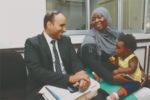I was personally not aware that Malawi had a somewhat significant Muslim population when I read this report by Nyasa Times discussing the trend of sex workers wearing the hijab in certain cities in Malawi. This is because I was aware that Malawi identifies itself as a Christian nation “with no religious conflict”, with the religion being followed by 83% of the Malawian population. Yet as I discovered, a minority of Malawians, 13%, are Muslim.
According to the report, sex workers are wearing hijab in order to attract clients from the expatriate Asian Muslim community. Hijabed sex workers are also popular among Malawian Muslims who as the article puts it “feel ashamed at dating bareheaded ladies” and those non-Muslims who want to know what it feels like to have sex with a Muslim woman.
There is no mention in the article as to whether the sex workers identify as Muslim, or if they are wearing the hijab for religious reasons. It is not unheard of for Muslim women who work as sex workers in majority Muslim communities or countries to wear hijab, and not just because of clients but because the hijab is part of their wardrobe. This happens in Northern Nigeria and Somalia for example.
The sex workers in Malawi who wear hijab apparently “rarely don’t take alcohol” and get most of their clienteles from bars and drinking joints, though according to the report, they pretend that they are just hanging out with friends on a night out when clients approach them.
The way this has been reported and discussed online troubles me, as Islam and the hijab are seen as adding an incongruous or titillating edge to the way women are objectified. It is telling that the accompanying image to the piece was one by “Islamic Erotica” artist, Makan Emadi whose work has been discussed on MMW, here and here.
And, on this article on Somali pirates, the caption under a woman dressed in niqab reads: “Prostitute Faduma Ali, who longs for the days when her pirate customers had money, chews the stimulant khat and smokes a cigarette.” The combination of the word “prostitute” with khat, cigarette, hookah, and niqab provokes a commentator to ask “how can you have a muslim prostitute?”
What makes the Malawian case unique is that it is not necessarily as simple as objectifying Muslim women, since these sex workers may or may not identify as Muslim, and it’s the same with their clients. This brings in several new elements which are not addressed here, such as how Asian Muslim men are affecting the lives of local Malawian Muslims.
The article ends somewhat ominously by citing “a prominent Muslim clerk” who has threatened to deal with those who are bringing “shame” to Islam’s reputation in Malawi.
Meanwhile the non-Muslim voices, as seen from the comments at Nyasa Times’ website, stress Malawi’s claim to no religious conflict, arguing that freedom of clothing is essential in Malawi and expressing concerns about Muslims reacting violently because that is how Muslims are.
The voices of women remains unsurprisingly silent in this report and in reactions. Whether their decision to wear hijab is simply a business strategy or whether these sex workers are Muslim and wear hijab, we simply don’t get to hear from them. It is presumably men that would lead to non-Muslim sex workers adopting hijab in a business move and it is men that are labelling this practice shameful and damaging to Islam’s reputation, while the voices of Muslim women remain mute.

